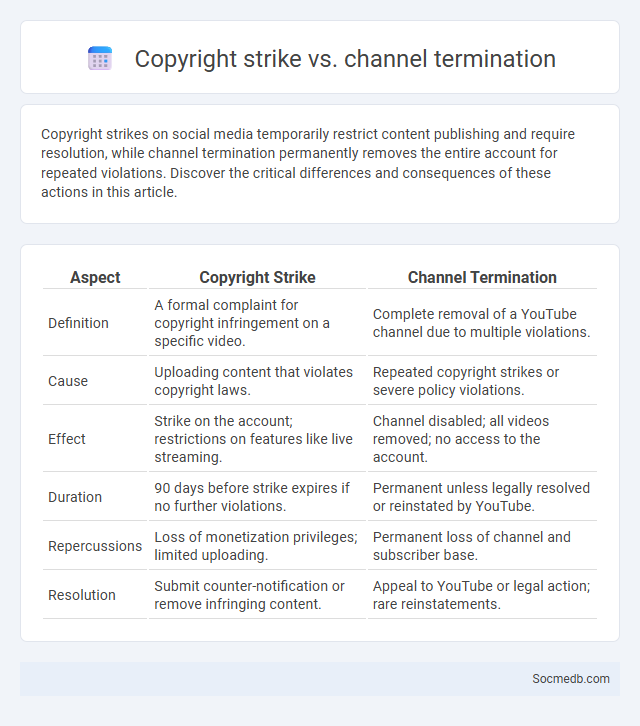
Photo illustration: Copyright Strike vs Channel Termination
Copyright strikes on social media temporarily restrict content publishing and require resolution, while channel termination permanently removes the entire account for repeated violations. Discover the critical differences and consequences of these actions in this article.
Table of Comparison
| Aspect | Copyright Strike | Channel Termination |
|---|---|---|
| Definition | A formal complaint for copyright infringement on a specific video. | Complete removal of a YouTube channel due to multiple violations. |
| Cause | Uploading content that violates copyright laws. | Repeated copyright strikes or severe policy violations. |
| Effect | Strike on the account; restrictions on features like live streaming. | Channel disabled; all videos removed; no access to the account. |
| Duration | 90 days before strike expires if no further violations. | Permanent unless legally resolved or reinstated by YouTube. |
| Repercussions | Loss of monetization privileges; limited uploading. | Permanent loss of channel and subscriber base. |
| Resolution | Submit counter-notification or remove infringing content. | Appeal to YouTube or legal action; rare reinstatements. |
Understanding Copyright Strikes on YouTube
Copyright strikes on YouTube occur when a creator uploads content that infringes on someone else's copyrighted material, such as music, videos, or images. Each strike restricts the user's ability to upload new content for a specified period and accumulating three strikes within 90 days results in channel termination. Understanding YouTube's Content ID system and fair use policies is crucial for avoiding strikes and maintaining channel integrity.
What Triggers a Copyright Strike?
Uploading copyrighted content without permission triggers a copyright strike on social media platforms. Examples include sharing videos, music, or images owned by others without authorization. Automated filters and user reports frequently detect violations, leading to strikes and potential account penalties.
Consequences of Multiple Copyright Strikes
Multiple copyright strikes on social media platforms often result in severe penalties such as account suspension or permanent deletion, significantly impacting user content visibility and platform credibility. These strikes can restrict users from uploading new content, monetizing videos, or engaging in live streams, directly affecting creators' revenue streams and audience reach. Repeated violations may also trigger legal consequences, reinforcing the importance of adhering to copyright laws in digital content creation.
Channel Termination: Causes and Process
Channel termination in social media occurs due to policy violations, prolonged inactivity, or violation of community guidelines. The process involves account suspension, warnings, and final deletion after appeals fail or violations persist. Understanding platform-specific termination policies ensures compliance and helps maintain account integrity.
Copyright Strike vs. Channel Termination: Key Differences
Copyright strikes and channel terminations represent different levels of enforcement on social media platforms. A copyright strike typically occurs when your content infringes on someone else's protected work, leading to temporary restrictions or content removal, while channel termination results from multiple strikes or severe violations, causing the permanent deletion of your entire channel. Understanding these key differences helps you navigate platform policies and protect your content from severe penalties.
Impact of Copyright Strikes on Channel Monetization
Copyright strikes significantly restrict a channel's ability to monetize content on platforms like YouTube, often resulting in demonetization and limited access to revenue-generating features. Repeated copyright infringements can lead to channel suspension or termination, jeopardizing long-term income streams from ads, memberships, and sponsorships. Effective copyright management and adherence to content policies are vital for sustaining consistent monetization and audience trust.
How to Respond to a Copyright Strike
If your social media content receives a copyright strike, promptly review the claim details to understand the infringement specifics. You should either remove the disputed material, seek permission from the content owner, or file a counter-notification if you believe the strike is erroneous. Protecting your account by responding correctly to copyright strikes ensures your social media presence remains intact and compliant with platform policies.
Preventing Copyright Issues: Best Practices
Preventing copyright issues on social media requires understanding platform-specific guidelines and consistently using original or properly licensed content. Employing tools like watermarking and metadata tagging helps protect intellectual property and track unauthorized use. Regularly monitoring posts and promptly addressing infringement claims through proper channels reduces legal risks and maintains brand integrity.
Appealing Copyright Strikes and Channel Termination
When appealing copyright strikes on platforms like YouTube, it is crucial to provide clear evidence of fair use, proper licensing, or original content ownership to avoid channel termination. Timely submission of counter-notifications with specific references to disputed material increases the chances of reinstating the content and protecting the channel's integrity. Repeated copyright infringements often lead to automated channel suspension, making proactive appeal strategies essential for long-term social media presence.
Legal Implications and Creator Rights
Social media platforms are governed by complex legal frameworks that impact both content creation and distribution, emphasizing intellectual property rights and user accountability. Creator rights are protected under copyright laws, enabling content creators to claim ownership and seek compensation for unauthorized use or copyright infringement. Legal implications also include compliance with data privacy regulations and the enforcement of content moderation policies to prevent defamation, harassment, or misinformation.
 socmedb.com
socmedb.com